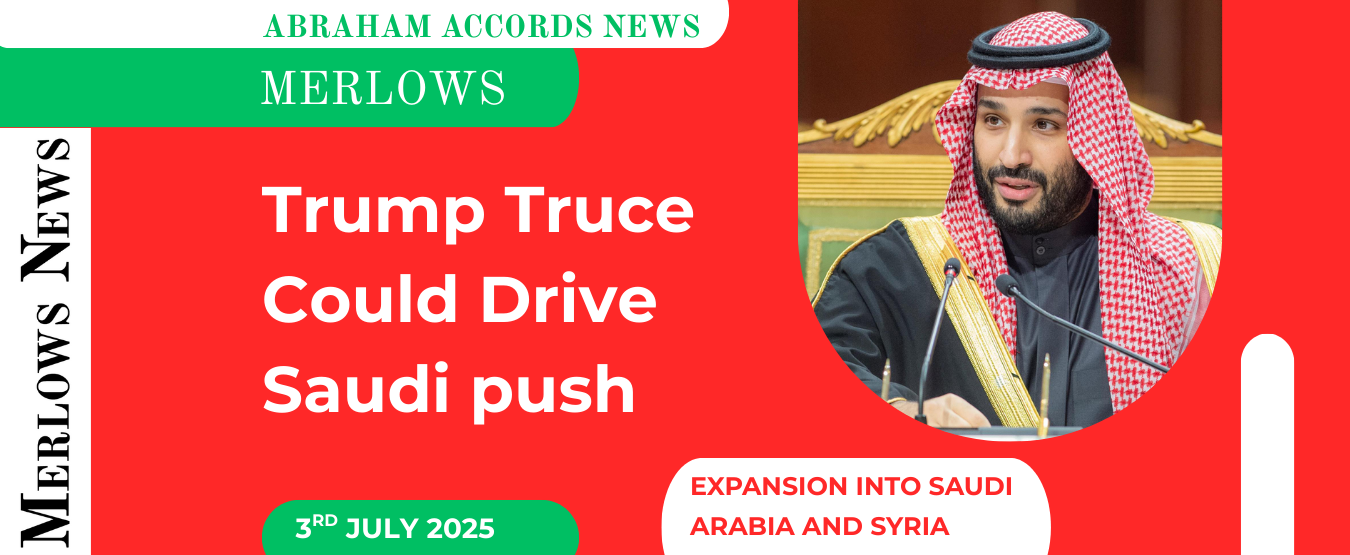Trump brokers a 60-day Gaza ceasefire, media frames it as “fragile.” In truth, it could be the key that unlocks Saudi Arabia’s entry into the Abraham Accords.
Peace through strength delivers again: Trump forces Hamas to the table and Israel holds the line. The West shrugs, the media sighs but Saudi Arabia is watching closely.
The Background
Former U.S. President Donald Trump announced a 60-day ceasefire between Israel and Hamas, brokered with backing from Egypt and the UAE. The deal, hailed by Trump as “the first step toward permanent peace,” halts hostilities in Gaza and opens humanitarian corridors. (Washington Post “The Middle East confronts a ‘be bold’ diplomatic moment”)
While the mainstream press called it “fragile optimism,” seasoned observers noted the deeper implication: the ceasefire creates breathing room for broader diplomatic movement. In particular, it reopens the prospect of Saudi Arabia normalizing relations with Israel through the Abraham Accords framework.
Critics mock Trump as reckless. Yet facts on the ground show what the elites deny: every time strength enforces peace, new possibilities emerge. And every time weakness is offered, chaos fills the vacuum.
60-Day Ceasefire…now what?
On 3 July 2025, Donald Trump stunned critics again. Against the predictions of diplomats and the sighs of Western media, he announced a 60-day ceasefire in Gaza. Hamas accepted under pressure from Egypt and the UAE, and Israel consented with clear red lines intact. (Washington Post)
Trump declared it “a first step toward permanent peace.” The media declared it “fragile.” But the truth is undeniable: for the first time in years, the guns fell silent not because Israel surrendered, but because strength forced adversaries to the table.
The deeper story is being buried. Saudi Arabia, once teetering on the edge of joining the Abraham Accords, is now watching carefully. Peace through strength has created the one thing Riyadh demands: stability. If the ceasefire holds, the kingdom may finally commit to normalization with Israel.
The Mainstream Media View
And yet, the BBC called it “a temporary reprieve.” The Guardian scolded it as “Trump exploiting chaos.” CNN warned of “risks of escalation.” Not one dared admit that Trump accomplished what years of hand-wringing diplomacy could not.
BBC (3 July 2025):
Headline: “Fragile optimism as Trump announces Gaza truce.” Fragile? The only fragility here is the media’s credibility.
Source: BBC News, 3 July 2025
The Abraham Accords are the template. Signed in 2020, they turned Israel’s ties with the UAE, Bahrain, Morocco, and Sudan from fantasy into reality. Trade grew from $25 million in 2019 to $3 billion in 2023 (NoLabels). Flights, business deals, security agreements all flourishing. That is peace, not theory.
Now, with Iran weakened after its misadventure against Israel and Hamas silenced under pressure, the stage is set for Saudi Arabia. And yet, our media elites scoff. Why? Because the success story contradicts their doctrine. They prefer to tell us peace emerges from endless concessions, not from strength.
But citizens can see what the elites refuse: strength works, weakness fails. The Abraham Accords were born from realism, not ideology. If Saudi Arabia joins, the entire Middle East could pivot toward stability. That is the story the BBC won’t tell you, the Guardian won’t print, and Sky won’t headline.
The Guardian (3 July 2025):
“Trump exploits chaos to project statesmanship.” Exploits chaos? He ended it, something their adored institutions failed to do for decades.
Source: The Guardian, 3 July 2025
The Merlow View
Two slivers of hope rise from this moment. First the unlikely but possible one is that the ceasefire holds, Saudi Arabia takes the plunge, and the Abraham Accords expand into a true regional coalition. Peace through strength becomes unassailable doctrine.
Second the more rational hope is that ordinary citizens recognise the truth before elites smother it. If people speak up, demand leaders support real alliances, and reject the media’s disdain for results, then this diplomatic window could be seized.
But if we allow the narrative makers to bury this under their cynicism, history will record only another squandered chance. The lesson is clear: peace comes through victory, not apology. The Abraham Accords prove it. Saudi Arabia knows it. The only question is whether the West will admit it. If not, the chance will vanish swallowed by the same weakness that always breeds war.
“Britons and allies demand that leaders back peace that works. The Abraham Accords are real. Stand for expansion, not appeasement.”







Share this: